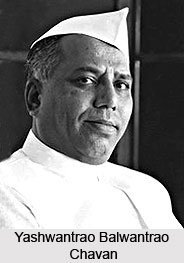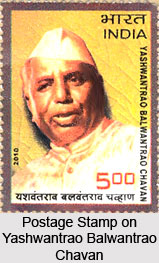 After the division of Bombay State, Yashwantrao Balwantrao Chavan became the first Chief Minister of Maharashtra. Subsequently became the Deputy Prime Minister of India. His vision of agro-industries with an emphasis on co-operative sector and regionally balanced industrial development of Maharashtra resulted in putting the State in the forefront of the nation. Shri Yashwantrao Balwantrao Chavan was responsible for many development initiatives. The laws regarding Democratic Decentralised Bodies - Village Panchayats, Panchayat Samitis and Zilla Parishads as well as the Agricultural Land Ceilings Act were passed during his regime as Chief Minister.
After the division of Bombay State, Yashwantrao Balwantrao Chavan became the first Chief Minister of Maharashtra. Subsequently became the Deputy Prime Minister of India. His vision of agro-industries with an emphasis on co-operative sector and regionally balanced industrial development of Maharashtra resulted in putting the State in the forefront of the nation. Shri Yashwantrao Balwantrao Chavan was responsible for many development initiatives. The laws regarding Democratic Decentralised Bodies - Village Panchayats, Panchayat Samitis and Zilla Parishads as well as the Agricultural Land Ceilings Act were passed during his regime as Chief Minister.
The legendary man was born on 12th March 1913 in the village of Devrashtre in Karad Taluka of Satara District of Maharashtra State of India to a poor Maratha family. Yashwantrao Chavan was commonly known as Chavan saheb. He passed B.A with History and Political Science from the Bombay University in 1938. In 1940 Yashwantrao became the President of Satara District Congress. In 1941 he passed LL.B. in the very next year he married Venutai. He died on 25th December 1984.
In 1930 he was punished and fined for his participation in the Non-Cooperation Movement led by Mahatma Gandhi. In the year 1932 he was sentenced to 18 months imprisonment for hoisting the Indian flag on 26th January 1932.
In the year 1946 he was elected as M.L.A from South Satara Constituency. In the same year he was appointed as the Parliamentary Secretary to the State Home Minister Shri Morarjibhai Desai. He was elected as M.L.A from Karad constituency and appointed Minister of Civil Supplies, Social Welfare and Forest in the council of Ministers headed by Shri. Morarjibhai Desai. In 1953 he was also the Signatory to the Nagpur Pact, assuring equitable development of all regions of Maharashtra.
He became The Chief Minister of Maharashtra from May 1, 1960 to November 19, 1962. In the year 1957 Yaswantrao was Elected as M.L.A from Karad constituency, elected as Leader of the Congress Legislature Party and became Chief Minister of the bilingual State. Within the year 1957 to 1960 he was Elected to All India Congress Working Committee and the Formation of Maharashtra as a separate State began. Shri Y.B. Chavan became the first Chief Minister of Maharashtra.
 Apart from being the first Chief Minister of Maharashtra, he also occupied the high positions of Defence Minister, Home Minister, Finance Minister, Foreign Minister, and ofcourse Deputy Prime Minister of India. In the year 1960 he was appointed as the Defence Minister of India, in the wake of India - China border conflict and resignation of Shri Krishna Moon. In the next year he was elected unopposed as M.P. from Nasik Constituency. He was appointed Home Minister of India in 1967 and appointed Finance Minister of India in 1970. He also served as Foreign Minister of India from 1974. in the year 1975 when an internal emergency was declared Congress lost power at the Centre. Shri Chavan became the Leader of Opposition in 1977.
Apart from being the first Chief Minister of Maharashtra, he also occupied the high positions of Defence Minister, Home Minister, Finance Minister, Foreign Minister, and ofcourse Deputy Prime Minister of India. In the year 1960 he was appointed as the Defence Minister of India, in the wake of India - China border conflict and resignation of Shri Krishna Moon. In the next year he was elected unopposed as M.P. from Nasik Constituency. He was appointed Home Minister of India in 1967 and appointed Finance Minister of India in 1970. He also served as Foreign Minister of India from 1974. in the year 1975 when an internal emergency was declared Congress lost power at the Centre. Shri Chavan became the Leader of Opposition in 1977.
Following the Emergency in 1977, like Devraj Urs, the dominating figure in Karnataka politics for many years and was thrice Chief Minister of the state, he left the Congress Party after Indira Gandhi`s defeat, and joined the latter`s Congress (Urs). He later championed under the influence of Jawaharlal Nehru, the view associated with the term `Sanyukta Maharashtra`, he almost accepted a bilingual state of Maharashtra. In 1982 he joined Indira Congress and appointed Chairman of the Eighth Finance Commission.
The Yashwantrao Chavan Pratishthan was established in Mumbai. The main objective of setting up the Pratishthan is to perpetuate his memory, acknowledge his rich, outstanding and valuable contribution. His contribution towards democratic institution building and development processes in India`s socio-political life and to undertake activities and programs particularly for the elevation of the common man and promote his cherished ideals nurtured in the freedom struggle and thereby strengthens socio-economic and political fibre of India.
With the above goal in view, important leaders and thinkers like Shri Vasant Dada Patil, Shri Annasaheb Shinde, Shri Sharad Pawar keenly felt that a memorial should be set up in the form of a living and dynamic organization which would carry on the creative development initiatives of the great leader. Accordingly the Yashwantrao Chavan Pratishthan came into existence and was registered under the Bombay Charitable Trusts Act and Societies Registration Act in 1985.
He had planned to write his autobiography in three parts. First part covering his early years in Satara district. His native place situated on the banks of Krishna River and therefore the name of the first part was "Krishna Kath" (The bank of the Krishna River). In the middle phase of his political development he was the Chief Minister of bilingual Bombay state and later from 1 st May 1960, the newly formed Maharashtra state. All these years were spent in Mumbai so the proposed name for the second volume was "Sagar Tir". Later in 1962 he was appointed by Prime Minister Jawaharlal Nehru as the Defence Minister of India. Till 1984 he was in Delhi so he had proposed the name "Yamuna Kath" for his third volume. He was able to complete and publish only the first volume.




















